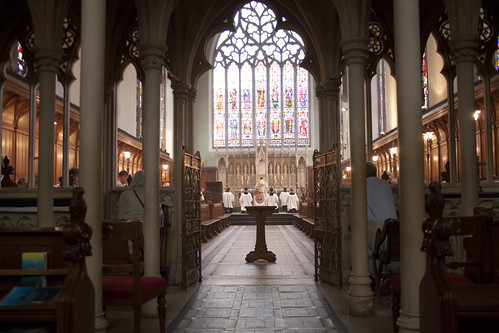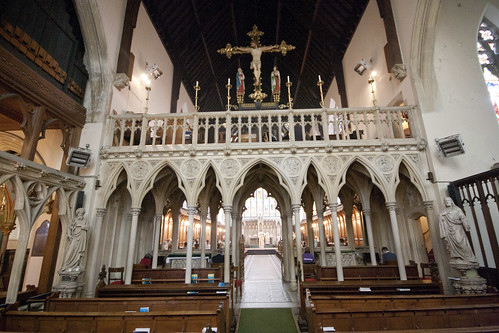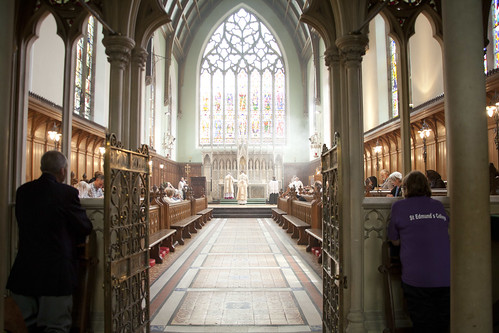Consistently since the time of the great Pope Leo XIII, and of course frequently, if not completely consistently, before that, the Holy See has presented itself as a special friend of the Christians of the East, and of their liturgical traditions. Faced with a complex set of groups, some in communion with the Holy See and some not, with distinct liturgical, spiritual, and artistic traditions, Popes, and the Second Vatican Council, laboured to emphasise that they valued these traditions, and that no compromise of them would ever be necessary for dissident groups which wished to be reconciled to the Holy See. Non-Latin Rite Catholics could help with this project by their own fidelity to their traditions, in many cases these being exactly the same traditions as those followed by churches not in communion. Were the Greek or Russian Catholics, for example, to 'Latinise' themselves, change their liturgical practices, their church architecture, their artistic traditions, their spirituality, to conform more closely with what is typical of the Latin Rite, this would be most regrettable, because it would create the impression that once you come under the authority of the Pope you will sooner or later bid farewell to the traditions of the Fathers.
In practice this policy has faced many difficulties. The apparent prestige of the Latin Rite, the Roman education of leaders of the Eastern Churches in communion with Rome and their exposure to Western ideas, the activities of Latin Rite religious orders, missionaries, and lay people in countries of Eastern heritage, and now the diaspora of Eastern Catholics among countries of Latin heritage, make the policy of absolute adherence to Eastern traditions difficult to maintain. The tendency towards Latinisation, at any rate, is something which those Churches have constantly to resist, and they are urged to resist it at the highest levels.
The policy of resistance to Latinisation was, to repeat, in place before the Second Vatican Council, it is affirmed powerfully in the Council's documents, and it remains the policy up to the present. And this is where it becomes interesting. Because any temptations towards Latinisation since the Council have naturally been towards the reformed liturgy. Latinisation today pulls the liturgy of Eastern Catholics away, not only from those Eastern Traditions which differ from Western Traditions, but away from aspects of the Eastern Tradition which are actually paralleled in the West: away, that is, from the shared tradition of East and West.

By the same token, the recognition of the value of Eastern traditions, affirmed notably by Pope St John Paul II, and in documents emanating from the Congregation for Oriental Churches, are not focused exclusively on Eastern traditions insofar as they differ from the West, but include traditions common to both East and West.
Thus we find the Congregation defending celebration ad orientem, singing by a choir while the priests says (different) prayers, and the distribution of Holy Communion exclusively by clerics. More profoundly, we find Pope St John Paul II giving a defence of a form of liturgical participation in which the word-by-word comprehension aimed at by the Novus Ordo is quite obviously impossible: where rites are carried on behind an icon-screen, for example, invisible, inaudible, and in any case in a language with the Faithful may not understand. He explains:
The lengthy duration of the celebrations, the repeated invocations, everything expresses gradual identification with the mystery celebrated with one’s whole person.
That is to say, that this is a form of participation which is not merely, or even primarily, of the intellect. As a matter of fact this is perfectly consistent with what St John Paul II said about the ancient Latin tradition, when he wrote about Latin, for example, that 'through its dignified character [it] elicited a profound sense of the Eucharistic Mystery.' (Apostolic Letter Dominicae Cenae, 1980)
It is not consistent, however, with the common perception of 'why the Mass had to change': what you will be told by almost any well-meaning Latin priest or theologian. What we find in the Magisterium's defence of the Eastern traditions, is often a defence, by implication, of the Western traditions, and a critique of the Western liturgical reform, as it is normally explained and as it was actually carried out.

More photos of St Edmund's College Ware, and the LMS Day of Recollection there, here.
Support the work of the LMS by becoming an 'Anniversary Supporter'.

Bishop Kasper has already admitted that the Vatican 2 documents were purposely written to be vague: http://veneremurcernui.wordpress.com/2013/04/17/kardinal-kaspar-claims-vatican-ii-vague-ambiguous
ReplyDeleteWe all know what a mess the Church is in now. So, are you REALLY saying that...don't worry about the synod...the worst it can be is vague.
Please....imho....the vagueness will go from gray to black with the smoke of utter confusion. And the trads will be vilified for following tradition, for not being inclusive, for being stuck in the past,for not being merciful to sinners, etc., etc, because the final synod report will be given the most liberal interpretation by most Catholics. And, with the utter persecution of the Franciscans of the Immaculate, what is going to happen to those who are attached to TLM? That's why I'm very concerned.
Many of those decades, the words of the Holy See and the Oriental Congregation (often disparagingly termed 'the Colonial Office' by Eastern Catholics) and the actions of the same were directly opposite. For example, as late as the 1930s, the Ruthenian Traditions were being suppressed in the US; while in India, the Malankara were being received en masse and urged to retain all of their Traditions, except this mentioned caveat - [the Malankara] should not "lag behind" in regard to mandatory celibacy of clergy... clearly opposed to retention of all Traditions...
ReplyDeleteOf course, it is true that the Holy See has been especially affirming to Easterners not in Communion with Rome, however, for some odd reason once Communion is established, such recognition is suppressed or diminished for outside interests.. interests such as Easterners not in Communion (see the in-limbo Patriarchal status of the Ukrainian Catholic Patriarch, as well as the pathetically ignored canonization and glorification of Blessed Andrey Sheptytsky)
You cite in the footnotes the following:
ReplyDelete"16 As Il Padre expresses it: ‘The first requirement of every Eastern liturgical renewal, as is also the case for liturgical reform in the West, is that of rediscovering full fidelity to their own liturgical traditions, benefiting from their riches and eliminating that which has altered their authenticity."
Why do we need to rediscover that which we believe we never lost?
Roman oppression is the norm. Not the exception
ReplyDelete